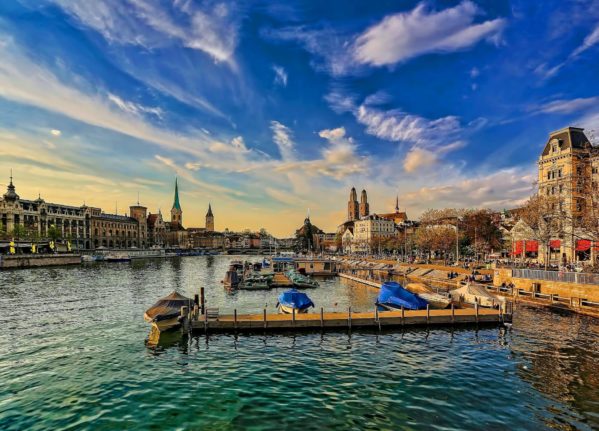Mein Grundeinkommen, or ‘My basic income’, is a non-profit based in Germany that has been researching universal basic income (UBI) since 2014.
In 2021, the organisation launched a three year pilot project in cooperation with the German Institute for Economic Research (DIW Berlin), to test how basic income would affect peoples’ behaviour and attitudes.
That experiment will be completed this spring and results will likely be made public by the end of the year.
In the meantime, Mein Grundeinkommen has been awarding basic incomes to individuals through a crowd-funded raffle system. According to the organisation’s website, 1,672 people have been provided temporary basic incomes of up to €1,200 per month.
“We’re now giving away ‘realistic’ and ‘utopian’ basic incomes so that people can experience it,” Miriam Witz, project developer at Mein Gruneinkommen, told The Local.
She explained that the ‘utopian’ incomes consisted of €1,000 monthly for a year, whereas the ‘realistic’ basic incomes range up to €1,200 per month depending on the salary of the recipient.
All residents of Germany can enter the raffles for a chance to win a temporary basic income.
Why is it important to think about universal basic income?
One common argument for the importance of UBI is that it guarantees a basic standard of living that is defined by your employment status. Workers whose jobs are threatened by AI provide a perfect example of why UBI may become a topic of increasing importance in the years to come.
But Witz suggests that, in the present, UBI can address the issue of growing economic inequality.
“The model we’re proposing would benefit 83 percent of the population, and for the next ten percent it doesn’t make a significant difference,” Witz said.
According to Witz, under the tax-based UBI model that Mein Gruneinkommen recommends, only the wealthiest ten percent of German residents would end up paying more than they get out of it.
“We would all benefit if the difference in peoples’ wealth wasn’t so high,” she added.
READ ALSO: Where in Germany do people have the most (and least) disposable income?
Inequality and the rise of populism
There’s reason to believe that reducing income inequality could have profound effects on society that extend beyond economics.
Workers strikes and farmers’ protests in recent weeks have shown that large groups of working class citizens are upset about rising costs, stagnant wages, and other income-related issues.
READ ALSO: Why Germany is being hit by strikes almost every day
Inequality likely also plays a significant role in the growing popularity of alt-right or populist political leaders. Clara Mattei details these connections in her recent book, Capital Order: How Economists Invented Austerity and Paved the Way to Fascism.
“When people are struggling to survive, they stop trusting the government or the people around them. Then they are more likely to listen to someone who says ‘there is someone you can blame’,” Witz explained.

Universal basic income can be a divisive topic
Along with Mein Grundeinkommen’s Germany-based experiment, a number of US cities have also experimented with giving low-income earners a supplemented income.
According to researchers, these trials have shown that UBI has tremendous potential to reduce homelessness, poverty, and often helps individuals become more productive.
But despite evidence that UBI could be positive for most citizens, the idea remains controversial.
“I have a feeling that people are very in favour of, or very against it,” Witz said.
She thinks that a lot of mistrust in UBI is probably a result of people not properly understanding it.
Whereas people often talk about UBI as if it is the government giving away free money, Witz suggests it’s basically a tax mechanism.
“For example, the climate money idea, Klimageld, would be very similar to UBI. So there’s a special tax, and then you redistribute that tax to citizens.”
Furthermore, Witz argues that adopting UBI would actually simplify Germany’s tax code. Because, if it’s done correctly, basic income for everybody eliminates the need for other types of assistance such as unemployment, social assistance, Bafög, housing benefits, or child support.
“Currently 50 percent of the people who would get money back from their taxes don’t get it back because it’s just so difficult,” Witz said, highlighting the frustration that Germany’s complex tax process can cause.
“I think huge changes are coming anyway, and UBI would be a very good mechanism to absorb some of those shocks.”
Ultimately, resistance to UBI in many cases likely begins with a fear of change, or a sense that the economic system is so large and complex that rethinking it is not feasible.
Whatever the reason may be, it doesn’t seem likely that Germany will seriously consider adopting UBI at the national level any time soon.
Asked if any political leaders have shown support for the concept, Witz said: “Honestly, I don’t see any right now.”
What’s next?
Mein Grundeinkommen’s first pilot project, which monitored 122 people over the past three years, will conclude in June 2024. A follow-up study is already in preparation.
Whether or not the results from those studies are enough to gather political support for broader UBI in Germany remains to be seen.
In the meantime, Mein Grundeinkommen continues to use crowdfunding to support a modest number of individuals with basic incomes.
The next basic income raffle winners will be drawn on February 14th at 7 pm. You can find more information and enter the raffle via the organisation’s website.





 Please whitelist us to continue reading.
Please whitelist us to continue reading.
Member comments